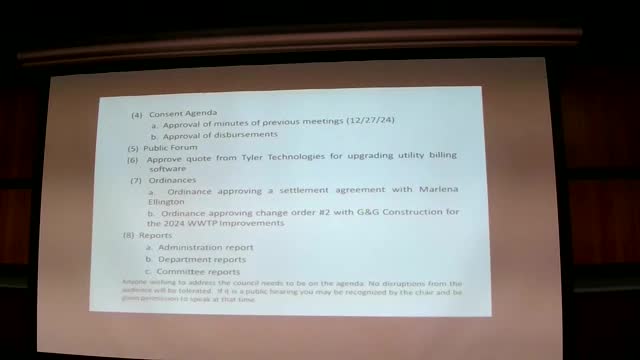Aldermen debate auditing special road-district reimbursements; staff to extract 2024 data
Get AI-powered insights, summaries, and transcripts
Subscribe
Summary
Board members discussed a longstanding issue: state statute entitles the city to 25% of taxes collected by special road districts either in money or in-kind work. Staff said they are compiling 2024 data to calculate an estimated $66,000 that could be due; the board discussed costs and feasibility of pursuing older years.
Carl Junction aldermen spent a significant portion of the meeting debating whether the city should audit reimbursements from local special road districts after staff said state statute entitles the city to 25% of taxes those districts collect.
A board member said the 25% requirement — either cash or in-kind work — has been a long-standing statutory obligation. Using preliminary figures and a 0.23 rate for calculation, staff and aldermen estimated the city might be owed about $66,000 for the last year; staff cautioned the number is preliminary and depends on final extraction and conversion of county tax records.
City staff said they have engaged a GIS contractor to separate properties north and south of Gum Road to identify parcels inside the city boundaries for the two special road districts and that the county provides tax books electronically. “I am just doing that. I did not get into going any farther back because it would have been more money, of course, to do it, but I'm only doing that 2024 tax rules,” a staff member said. Staff said the county data arrived as a PDF and must be converted to Excel and checked before totals can be confirmed.
Board members discussed options for recovering past underpayments. One alderman noted that pursuing many years of retroactive reimbursement would likely require litigation and legal costs that could exceed recoverable amounts; staff and other members said an in-house review of the most recent year is feasible but time consuming. “If you just do the one year, we have a lot better chance of getting that money,” a staff member said.
The board directed staff to complete the 2024 extraction and issue a written request to the relevant special road districts documenting the city’s calculation and in-kind offsets for 2024. Staff said they can do more historical review if the board chooses but warned it will increase cost and may require legal action if districts lack funds to reimburse past years.
Aldermen also discussed operational help previously provided by the Carl Junction Special Road District, historical absence of tracking for in-kind contributions, and the possibility that some prior years’ contributions were provided as labor rather than cash and were not documented in a way that would make a retroactive claim straightforward.
